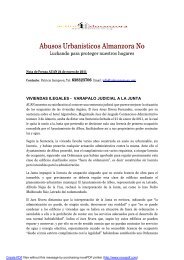European Property Rights and Wrongs - Diana Wallis MEP
European Property Rights and Wrongs - Diana Wallis MEP
European Property Rights and Wrongs - Diana Wallis MEP
Create successful ePaper yourself
Turn your PDF publications into a flip-book with our unique Google optimized e-Paper software.
same. In Chassagnou v France (application 25088/94 etc, April 29th 1999) local<br />
inhabitants were given hunting rights over private l<strong>and</strong> in the commune, but the<br />
legislation allowing this fell when it emerged that the legislation in the Dordogne<br />
did not apply in many other départements of France. The Valencian authorities<br />
may need to explain why their version of the infrastructure law has created so<br />
much greater injustice than the less intrusive regimes in place in other regions.<br />
It is relatively easy to find that an activity of a public body is potentially subject<br />
to a human rights review, but much more difficult to find an actual breach. This<br />
is because it is open to the state to justify an interference with property, <strong>and</strong> a<br />
wide margin of appreciation is allowed in favour of a state. Justification involves<br />
two preconditions – lawfulness <strong>and</strong> the proportionate pursuit of a legitimate aim<br />
of public policy. So far as lawfulness is concerned, presumably the actions in behaviour<br />
in Valencia have been within the broad remit of legislation passed by<br />
the regional authority, but one might wish to consider in detail whether legal<br />
procedures have been followed <strong>and</strong> whether any corruption or improper motive<br />
can be proved. The potential difficulty of breaches of EU public procurement rules<br />
has receded in the light of the ECJ decision in Commission EU v Spain (C-306/08,<br />
May 26th 2011). Even if most cases involve actions that are legal, one might expect<br />
a residue of cases in which the legitimacy of what has been done is open to<br />
question. Finally, then, most human rights cases boil down to a dispute about the<br />
justification of particular legislation. It is relatively easy for a state to show that it<br />
has passed enactments in pursuance of a legitimate object. That done the task is<br />
to show that the solution adopted is proportionate.<br />
Interference must achieve a “fair balance” between the dem<strong>and</strong>s of the general<br />
interest of the community <strong>and</strong> the requirements of the protection of the<br />
individual’s fundamental rights. … [T]here must be a reasonable relationship of<br />
proportionality between the means employed <strong>and</strong> the aim pursued. In determining<br />
whether this requirement is met, the Court recognises that the State enjoys a<br />
wide margin of appreciation with regard both to choosing the means of enforcement<br />
<strong>and</strong> to ascertaining whether the consequences of enforcement are justified<br />
in the general interest for the purpose of achieving the object of the law in question.<br />
The requisite balance will not be achieved if the person concerned has had to<br />
bear an individual <strong>and</strong> excessive burden (Depalle v France, application 34044/02,<br />
March 29th 2010, para 83).<br />
52<br />
A <strong>European</strong> L<strong>and</strong> Law?



